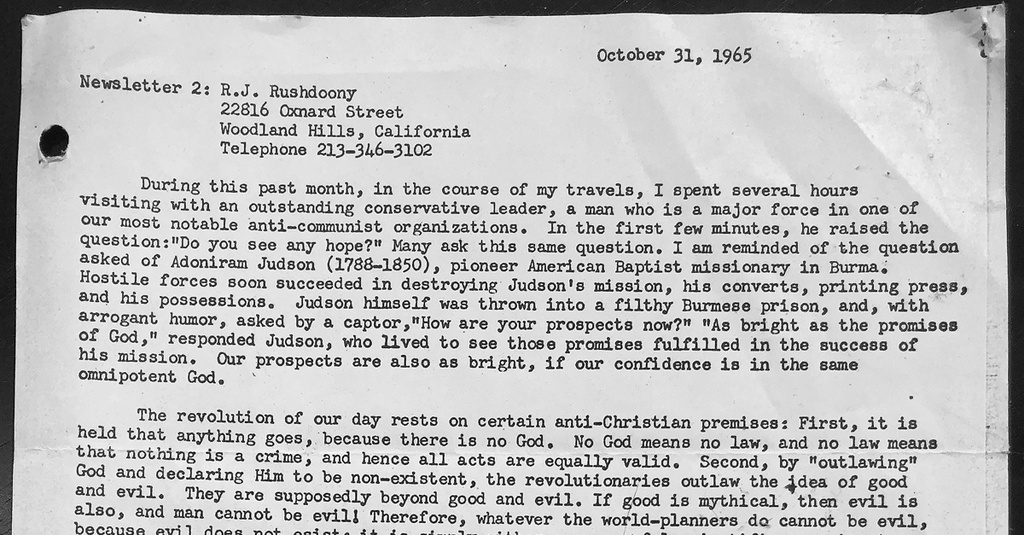
A Wider Door of Opportunity: How Chalcedon’s Mission Remains Relevant
The times are changing, and this provides a wider door of opportunity as more Christians are seeing that a more serious application of God’s Word is necessary to contend with the growing darkness they see in all areas of life.

- Chalcedon Editorial
Responsibility is a “tough sell” in the modern age, and we know that all too well at Chalcedon. We are sure you do also, as any attempts to share or argue for Biblical law, dominion, postmillennialism, or Christian education are met with a predictable resistance to the implications of personal responsibility and faithfulness, or the false assumption that we are trying to usher in the Kingdom of God “by our own efforts.”
However, not all Christians shirk at the tenets of Christian Reconstruction. After all, here you are reading the Chalcedon Report, but you know as well as we do that we are a minority in both society and the church.
It is still a fact that promoting our message remains difficult, but that may be changing as our times are changing. People are gravely concerned about the future of civilization and the world that’s being left to their children. They know it is no longer “business as usual” if there is going to be real change in society. They’re looking for solutions, and we want to meet them where they are.
Dedicated Minority
In his first newsletter to his small band of supporters in 1965, Rushdoony so precisely described the nature of our world’s problem, and the necessary solution, that it may be the citation we reference the most:
The future must be won, and shall be won, by a renewal and development of our historic Christian liberty, by an emphasis on the fact: the basic government is the self-government of the Christian man, and by a recognition that an informed faith is the mainspring of victory. History has never been dominated by majorities, but only by dedicated minorities who stand unconditionally on their faith.
What you are doing, in your support of me, is to sponsor a countermeasure to the prevailing trend, to promote by your support, interest, and study, a Christian Renaissance, to declare by these measures your belief that the answer to humanism and its statism is Christian faith and liberty. Our choice today is between two claimants to the throne of godhood and universal government: the state, which claims to be our shepherd, keeper, and savior, and the Holy Trinity, our only God and Savior. You have made your choice by both faith and action.1 (emphasis added)
We cannot improve upon this, which is why it remains the ruling thesis behind Chalcedon’s mission. In fact, we lifted “informed faith” and “faith and action” from these passages to be used as the titles for the two multi-volume collections of Rushdoony’s Chalcedon Report articles and position papers.2
We believe that the answer to tyranny is Christian faith and liberty, but that means more than simply opposing statism or cultural evil. That would be equivalent to only plucking weeds out of a lawn instead of crowding out the unwanted plants by growing healthy grass. A true restoration of Christian faith and liberty requires building more than protesting. Strong families, strong churches, and strong institutions are vital to cultural change.
Our Bestseller?
Christians require an informed faith so they can be moved to faith and action, and what is most lacking is an informed faith. What is an informed faith? It’s not simply doctrinal propositions, creeds, or confessions; it’s rather demonstrating how our historic faith and Biblical law are to be applied to a culture that’s in flux. Or as Rushdoony mentioned about his purpose for writing a systematic theology:
For me theology means the total mandate of God through His word. What I have written only scratches the surface; it is an introduction to the subject, and it is written to move men to faith and action.3
When you consider the history of Chalcedon and the work of R. J. Rushdoony, it produced many who devoted themselves to Christian action of all kinds. They did not merely protest statism. They built Christian schools or began homeschooling. In other words, by reading Rushdoony, men and women did not become more contemplative, but rather more active. They were looking for ways to apply their faith.
Consider the fact that now the cultural decline is far more obvious to the average Christian, and we’ve already seen within the last few years the greatest exodus out of the public school system. This quiet revolution will only increase as we’re seeing “wokeism” drive even more to consider alternatives to both government and commerce.
Rushdoony was the first to emphasize the use of the Christian tithe to help finance alternative institutions to that of the state, and although this is the answer to much of our ills, the resistance to such a proposition has been great. After all, you’re touching two sensitive topics: responsibility and tithing. Chalcedon vice-president, Martin Selbrede, once described a way to measure the progress of Christian Reconstruction in our culture:
[T]hat Christians tithe all the tithes commanded in the Bible, which includes the Levitical tithe, the poor tithe, and the rejoicing tithe. All of it. Every last, decentralizing, state de-bloating cent of it. It is truly pitiful that one of Chalcedon’s worst selling books is the 1979 volume Tithing and Dominion, by Edward A. Powell and R. J. Rushdoony (T&D for short). We can conclude that meaningful progress has been made when Tithing and Dominion has become a Chalcedon bestseller. That day is still only a sparkle in God’s eye.4
If Rushdoony’s Tithing and Dominion becomes our bestseller, then we’ll know the coin has dropped on the meaning and application of Christian Reconstruction. Until we engage in creating and underwriting alternative means of government, justice, education, health, and more, we will find ourselves forever protesting cultural decline but offering no other options.
Parallel Society
In the early 1980s, the rise of the Religious Right was attached to the thinking of Christian Reconstruction which cemented the idea that Christian dominion equates to political takeover. We saw this happen again in the first decade of the new millennium as the two terms of George W. Bush elicited the threat of “Christian theocracy” with Christian conservatives being credited with securing Bush’s second term especially.
It’s happening again. While the label now is “Christian Nationalism,” the conspiracy theory is the same. Radical Christians want to take over the American system and impose religious rule on an unwilling population.
However, there is one significant difference in that political conservatives are finally considering alternate solutions to the culture around them. Many are using “parallel society” as a description of this trend, but it is certainly closer to the tithing and dominion model offered by Chalcedon. We use our tithing and Christian action to create alternative means of government, charity, education, healthcare, and more.
Christian Reconstruction is not a political movement because politics cannot deal with the moral character of people nor can it provide the needed spiritual capital for Christian civilization. The great need at this time is to embrace and apply the blueprints given to us by R. J. Rushdoony, and the purpose of Chalcedon is to publish and promote that message and mission.
59 Years Young
Therefore, our mission is to educate others in Christian Reconstruction, which means we still need to be that dedicated minority committed to the long-term mission of godly dominion. The enemies of God will continue their slander and lies, but like Nehemiah, we must be focused on building. We will endure attacks by the church abroad as well, but all of this is par for the course.
Still, the times are changing, and this provides a wider door of opportunity as more Christians are seeing that a more serious application of God’s Word is necessary to contend with the growing darkness they see in all areas of life. Chalcedon has something to offer them, by way of a full-orbed Christian worldview, but we need your continued prayers and financial support to meet them where they are. As a dedicated minority, we’ve made it 59 years, and we can go so much further. Let’s do that together. Please take a moment today to prayerfully consider supporting Chalcedon.
1. R. J. Rushdoony, Faith & Action: The Collected Articles of R. J. Rushdoony from the Chalcedon Report, 1965-2004, Volume 3 (Vallecito, CA: Chalcedon/Ross House Books, 2018), pp. 1201-1202.
2. R. J. Rushdoony, Faith & Action: The Collected Articles of R. J. Rushdoony from the Chalcedon Report, 1965-2004. R. J. Rushdoony, An Informed Faith: The Position Papers of R. J. Rushdoony. Both are available at https://chalcedonstore.com.
3. R. J. Rushdoony, Systematic Theology in Two Volumes (Vallecito, CA: Ross House Books, 1994), p. xv.
4. Martin G. Selbrede, “Tithing & Building,” Faith for All of Life, May-June, 2006.

- Chalcedon Editorial